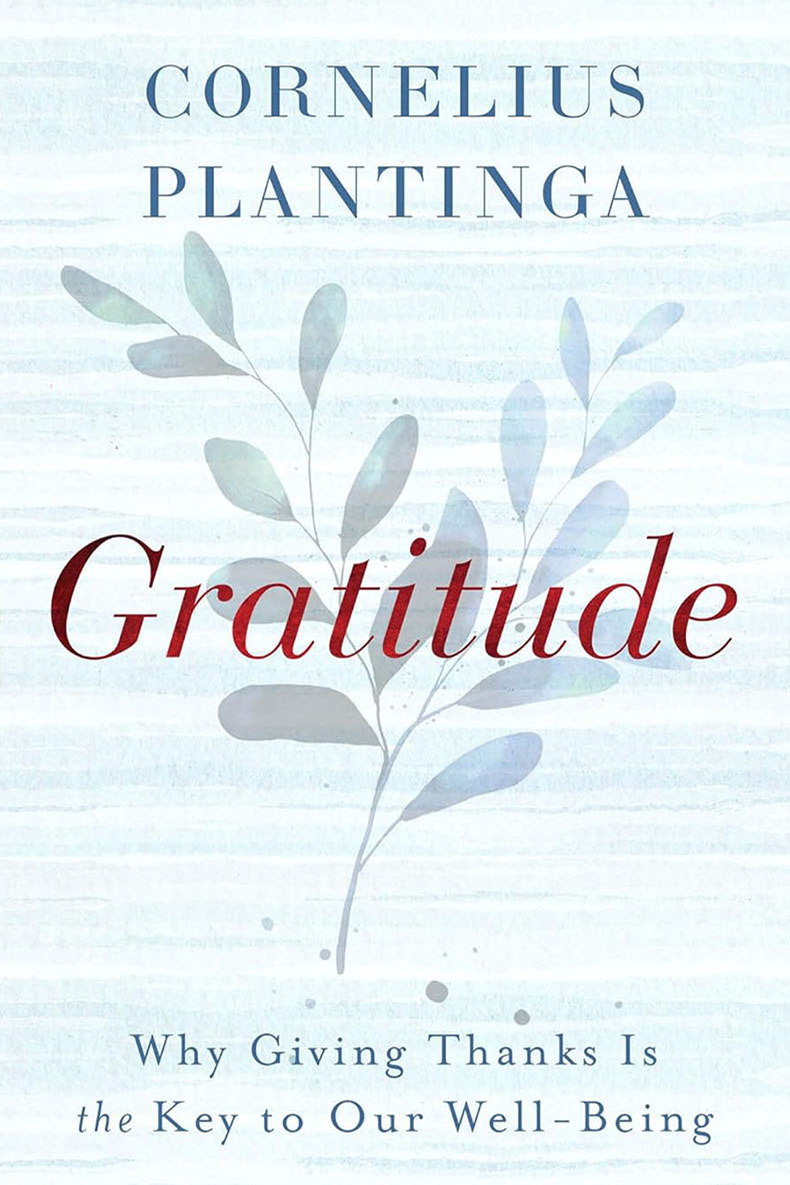Gratitude: Why Giving Thanks is the Key to Our Well Being, by Cornelius Plantinga. Grand Rapids: Brazos Press, 2024. 176 pp. $22.99.
The author, Cornelius Plantinga (PhD, Princeton Theological Seminary) is president emeritus of Calvin Theological Seminary. He is the author of many books, including the Christianity Today Book Award winner Not the Way It’s Supposed to Be, Under the Wings of God: TwentyBiblical Reflections for a Deeper Faith, and Morning and Evening Prayers.
Plantinga tackles the challenge of defining gratitude:“Gratitude is a glad sense of being gifted with something by someone and thus being indebted to the giver.” Further,“it’s a mixed sense of being blessed by and therefore indebted to a giver, usually accompanied by warm feelings toward that giver” (7). Feeling both warmth as a recipient and gratitude as a debtor capture two related but distinct responses to beneficence.
For Christians, we respond gratefully to God’s most incredible bless-ings. The Apostles’ Creed says, in him we have“the forgiveness of sins,the resurrection of the body, and the life everlasting.” “You might say that the whole Christian life is a way of trying, however inadequately, to give thanks for these magnificent gifts” (2). For this reason alone, grati-tude is“an urgent necessity” (3), a proper response to God we cannot afford to miss.
Are there personal benefits to being grateful? Studies demonstrate that grateful people have higher energy and lower blood pressure. They have less frustration and insomnia. They have more patience and hope.In fact, gratitude is the single best predictor of human well-being (4). Gratitude heals.“If I have gratitude, it may console me in my loss of a loved one” (47). You will also see that the happiest human beings seem to be the most grateful. Why? Could it be that gratitude is an engine of joy? But is gratitude sustainable?
Gratitude is not just a periodic sense of being blessed and indebted.Grateful people are inclined to feel gratitude most of the time. They have, so to speak, a light trigger for feeling like this. We could say they have a grateful disposition. If it remains stable over time, this disposition may be called a character trait. It’s in character for a person with this trait to respond to good things with a sense of being blessed and in-debted (7).
One common theme provoking gratitude in the hearts of ancient Israelwas God’s mighty acts beginning with creation and continuing withGod’s providence particularly when he rescues. Examples include the exodus but especially the death and resurrection of Jesus, the mightiest act of all. These acts are gratitude worthy because they show God’s goodness and especially God’s love. It is easy to miss the content of Pe-’ters sermon heard on the Day of Pentecost in other languages; it was the mighty acts of God. To this point, Plantinga reminds us that “the mighty acts of Christ are the acts of God” (21).
Gratitude should be a habit, a way of life, and not incidental.“Oncewe believers have gotten in the habit of being grateful, we find triggers for gratitude everywhere. All we need to do is to move through God’s world in an observant frame of mind” (25). But spoilers threaten our gratitude. The author demonstrates his sensitivity to the complexity of gratitude as he discusses the impact of greed:Greed blocks gratitude because it makes me discontent. If I’m never satis-fied and always want more, I’m unlikely to be grateful for what I al-ready have. This is a real disadvantage, to put it mildly. Why? Because,’as we’ve already seen, gratitude makes what we have enough. Withgreed there is never enough.… Simple things give me joy because I am so grateful for them. And I can be grateful for them just because I am content with them (36).This is because“gratitude and contentment are classic ingredients inhuman flourishing.… The obstacle to gratitude…is not riches but greed for riches.… Greed is always a curse when it thwarts contentment and gratitude” (36–37).
In short, surveys and other studies demonstrate that“gratitude appears to be the single virtue most prominently associated with human flourishing” (58). Should it surprise us that these studies support whatScripture plainly teaches us? This book is a great read. Every Christian would benefit from this book. It is one of those books you could give to every family member.
Dave Deuel
Joni and Friends International Ministries, Broadalbin, NY

